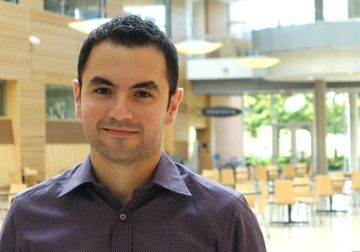
Rouzbeh Ghadiry-Tavi
Each summer, students from across the UBC Faculty of Medicine’s MD Undergraduate Program have the opportunity to pursue their passion for medical research and work closely with faculty members from across the province through the Summer Student Research Program (SSRP).
From exploring the benefits of exercise for stroke recovery to understanding how to provide culturally safe care, students in the SSRP are encouraged to take a deeper look into a wide variety of research topics.
We checked in with Rouzbeh Ghadiry-Tavi, a fourth-year medical student in the Southern Medical Program (SMP), to learn more about his research on cardiac function and physical activity in children with congenital heart disease (CHD) and how the experience has influenced his studies.
What sparked your interest in research?
My first research experience was at a cardiac physiology lab during my undergrad. A friend of mine told me about a young professor, Damon Poburko, a UBC Pharmacology and Therapeutics alumnus and Biomedical Physiology and Kinesiology Professor at Simon Fraser University, who was at the beginning stages of establishing his lab. When I first met Dr. Poburko, we ended up talking for an hour, mostly about physiology and his research. I left the meeting excited about the prospect of learning from a cool guy who was very passionate about what he did.
Describe your research project?
We already know from previous research that children with congenital heart disease (CHD) have low physical activity levels and that only 10 per cent of them meet the recommended physical activity levels, as suggested by the guidelines. What we wanted to know is whether these low levels can be explained by impaired cardiac function or if other sociocultural factors can best account for them.
My supervisor, Kevin Harris, Assistant Professor and Pediatric Interventional Cardiologist at BC Children’s Hospital, provided me access to a database that contains data on physical activity levels (objectively measured with accelerometers) and cardiac function (as measured by echocardiography) in children with CHD. My role was to extract and analyze the data and contribute to the manuscript of a research article.
How will this research experience help you in your medical studies?
It gave me valuable exposure to pediatric cardiology. By engaging in this research, I’ve been able to participate in the cardiology teaching sessions, clinical and academic rounds, and see what cardiologists do in the catheterization lab and in the clinic.
How has it influenced your perspective on medicine and patient care?
We often hear ‘medicine is always changing,’ but I think a more accurate statement is that we keep changing medicine because we keep finding better ways of doing it. It is fine to rely on guidelines and resources and keep using an already existing body of knowledge to treat patients. But I personally find it very exciting to go beyond that by improving our patient care in novel ways. If I can look back at my life and be able to say clinicians are doing this one thing differently because of what I found and the questions that I answered, that would be a sweet life.
What advice do you have for other students interested in pursuing a SSRP?
Do it for you! The reason I wake up early and dedicate my days to this research project is because I absolutely love what I do and therefore it does not feel like work.